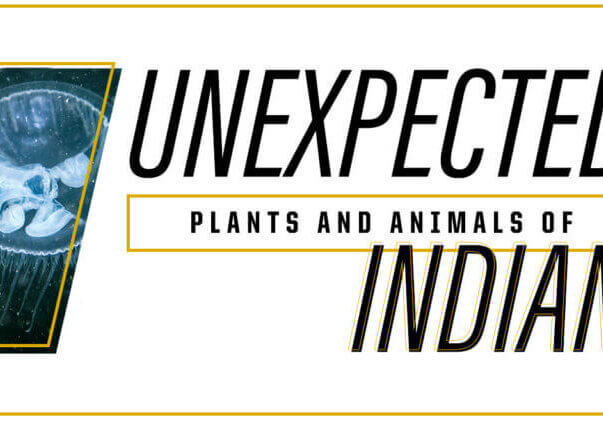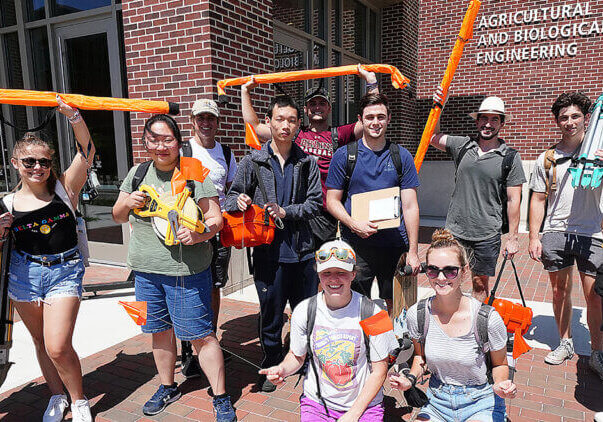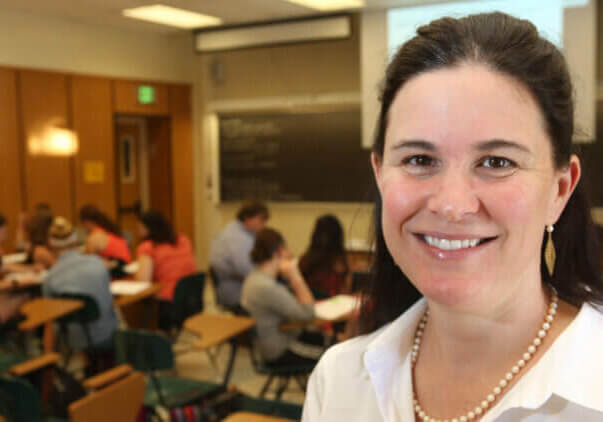A
Purdue team is seeking to increase diversity within the graduate programs in the colleges of agriculture, pharmacy and science by visiting University of Puerto Rico (UPR) campuses. Elizabeth Tran, professor of biochemistry, leads the project and a team that includes Mark C. Hall (Biochemistry), Andrea Kasinski (Biology), Tony Hazbun (Medicinal Chemistry and Molecular Pharmacology), and graduate student Zulaida Soto Vargas (Biology).
“We have a couple of alumni from Purdue College of Agriculture in faculty positions at the University of Puerto Rico who we’ve been in contact with,” said Mark C. Hall. Edwin Traverso Aviles, who received his Ph.D. in Biochemistry and Molecular Biology at Purdue in 2002, is now a faculty member at UPR-Humacao.
“It is of great satisfaction for me to collaborate with Purdue faculty in their efforts to recruit students from the University of Puerto Rico at Humacao,” said Traverso. “I know firsthand the high standards of Purdue graduate education.” The Purdue faculty team will visit six out of the eleven total UPR campuses.
“Our presentations and interactions with the UPR faculty and students will cover professional development topics, information, and tips on applying to the graduate school and information about Purdue University,” said Hazbun. “We know that it is an intimidating process to apply to graduate schools, students often have so many questions, and we will be providing a friendly and informative session that will help to answer many of those questions.”
Biology graduate student Vargas said, "It is a privilege to be able to travel back to Puerto Rico, where I am originally from, to recruit and encourage more students to continue graduate studies at Purdue University. My experience as a Puerto Rican graduate student at Purdue has been amazing. I have received so much support from many people, and the least I can do is share my experience with the undergraduate students at URP so they can consider Purdue as a great opportunity."
Funds from John Gates, Vice Provost for Diversity and Inclusion and clinical professor in the Krannert School of Management, enabled the group to plan the first trip in November 2021.
“I am pleased to provide support for this project,” said Gates. “I look forward to welcoming new scholars to our campus as a result of this important trip.”
“Purdue has a strong commitment to diversity and inclusion, and we are excited to be involved in an active graduate student recruitment effort to continue building our community,” said project leader, Elizabeth Tran.
Unexpected Plants and Animals of Indiana: Freshwater Jellyfish
Simple and complex are antonyms, but not with jellyfish.
Jellyfish lack brains, bones, hearts and lungs. More than 95% of their bodies are water. Early scientists debated whether jellyfish were even animals, commonly labeling them “zoophytes,” intermediaries between animals and plants.
Jellyfish meet biology’s modern criteria for classification as animals, yet are not fish despite their name. Their lack of backbones makes them members of the phylum Cnidaria, which includes coral and sea anemones.
Read Full Story >>>Purdue Agricultural Biological Engineering Program Ranked #1
Purdue University’s Agricultural Biological Engineering (ABE) undergraduate program has earned the number one ranking in its category in the annual U.S. News & World Report undergraduate program rankings for the eleventh consecutive year. U.S. News also ranked Purdue’s ABE graduate program number one earlier this year. The department includes 382 undergraduate and 191 graduate students.
Read Full Story >>>PWL instructor saves time, trouble using Variate for personalized math-based assessments
Creating new versions of math-based problems can be time-consuming. Katy Rainey, associate professor of plant breeding and genetics in the Department of Agronomy at the Purdue West Lafayette campus, was looking for a sustainable way to generate unique versions of genetics problems for her course — something she previously did manually every semester.
Read Full Story >>>Unexpected Plants and Animals of Indiana: Freshwater Jellyfish
Simple and complex are antonyms, but not with jellyfish.
Jellyfish lack brains, bones, hearts and lungs. More than 95% of their bodies are water. Early scientists debated whether jellyfish were even animals, commonly labeling them “zoophytes,” intermediaries between animals and plants.
Jellyfish meet biology’s modern criteria for classification as animals, yet are not fish despite their name. Their lack of backbones makes them members of the phylum Cnidaria, which includes coral and sea anemones.
Read Full Story >>>Purdue Agricultural Biological Engineering Program Ranked #1
Purdue University’s Agricultural Biological Engineering (ABE) undergraduate program has earned the number one ranking in its category in the annual U.S. News & World Report undergraduate program rankings for the eleventh consecutive year. U.S. News also ranked Purdue’s ABE graduate program number one earlier this year. The department includes 382 undergraduate and 191 graduate students.
Read Full Story >>>PWL instructor saves time, trouble using Variate for personalized math-based assessments
Creating new versions of math-based problems can be time-consuming. Katy Rainey, associate professor of plant breeding and genetics in the Department of Agronomy at the Purdue West Lafayette campus, was looking for a sustainable way to generate unique versions of genetics problems for her course — something she previously did manually every semester.
Read Full Story >>>

